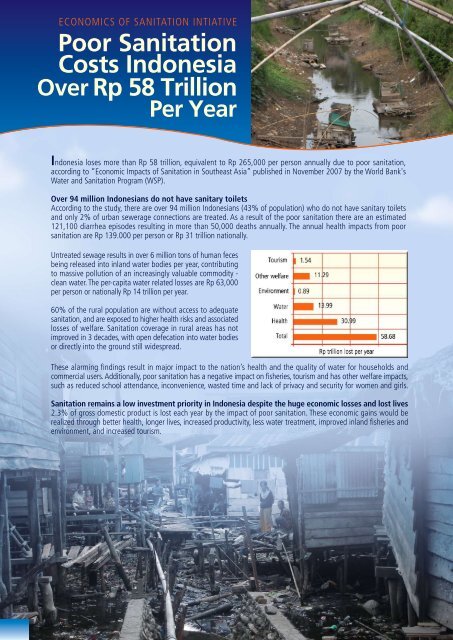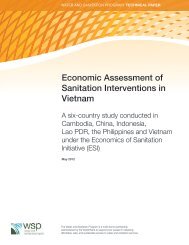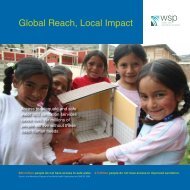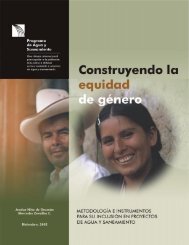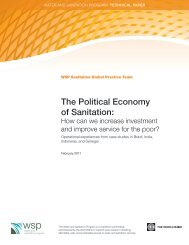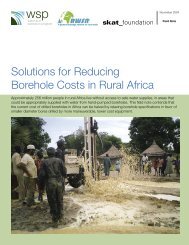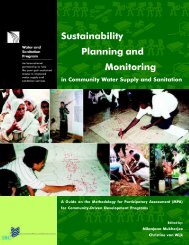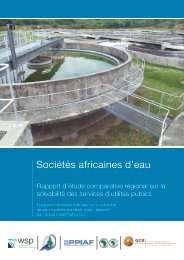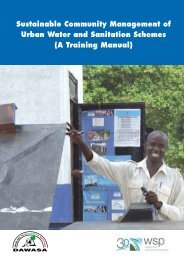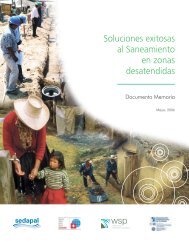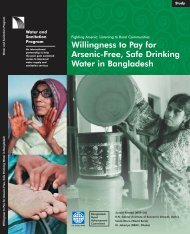Economic Impacts of Sanitation in Indonesia - WSP
Economic Impacts of Sanitation in Indonesia - WSP
Economic Impacts of Sanitation in Indonesia - WSP
Create successful ePaper yourself
Turn your PDF publications into a flip-book with our unique Google optimized e-Paper software.
ECONOMICS OF SANITATION INTIATIVE<br />
Poor <strong>Sanitation</strong><br />
Costs <strong>Indonesia</strong><br />
Over Rp 58 Trillion<br />
Per Year<br />
<strong>Indonesia</strong> loses more than Rp 58 trillion, equivalent to Rp 265,000 per person annually due to poor sanitation,<br />
accord<strong>in</strong>g to “<strong>Economic</strong> <strong>Impacts</strong> <strong>of</strong> <strong>Sanitation</strong> <strong>in</strong> Southeast Asia” published <strong>in</strong> November 2007 by the World Bank's<br />
Water and <strong>Sanitation</strong> Program (<strong>WSP</strong>).<br />
Over 94 million <strong>Indonesia</strong>ns do not have sanitary toilets<br />
Accord<strong>in</strong>g to the study, there are over 94 million <strong>Indonesia</strong>ns (43% <strong>of</strong> population) who do not have sanitary toilets<br />
and only 2% <strong>of</strong> urban sewerage connections are treated. As a result <strong>of</strong> the poor sanitation there are an estimated<br />
121,100 diarrhea episodes result<strong>in</strong>g <strong>in</strong> more than 50,000 deaths annually. The annual health impacts from poor<br />
sanitation are Rp 139.000 per person or Rp 31 trillion nationally.<br />
Untreated sewage results <strong>in</strong> over 6 million tons <strong>of</strong> human feces<br />
be<strong>in</strong>g released <strong>in</strong>to <strong>in</strong>land water bodies per year, contribut<strong>in</strong>g<br />
to massive pollution <strong>of</strong> an <strong>in</strong>creas<strong>in</strong>gly valuable commodity -<br />
clean water. The per-capita water related losses are Rp 63,000<br />
per person or nationally Rp 14 trillion per year.<br />
60% <strong>of</strong> the rural population are without access to adequate<br />
sanitation, and are exposed to higher health risks and associated<br />
losses <strong>of</strong> welfare. <strong>Sanitation</strong> coverage <strong>in</strong> rural areas has not<br />
improved <strong>in</strong> 3 decades, with open defecation <strong>in</strong>to water bodies<br />
or directly <strong>in</strong>to the ground still widespread.<br />
These alarm<strong>in</strong>g f<strong>in</strong>d<strong>in</strong>gs result <strong>in</strong> major impact to the nation’s health and the quality <strong>of</strong> water for households and<br />
commercial users. Additionally, poor sanitation has a negative impact on fisheries, tourism and has other welfare impacts,<br />
such as reduced school attendance, <strong>in</strong>convenience, wasted time and lack <strong>of</strong> privacy and security for women and girls.<br />
<strong>Sanitation</strong> rema<strong>in</strong>s a low <strong>in</strong>vestment priority <strong>in</strong> <strong>Indonesia</strong> despite the huge economic losses and lost lives<br />
2.3% <strong>of</strong> gross domestic product is lost each year by the impact <strong>of</strong> poor sanitation. These economic ga<strong>in</strong>s would be<br />
realized through better health, longer lives, <strong>in</strong>creased productivity, less water treatment, improved <strong>in</strong>land fisheries and<br />
environment, and <strong>in</strong>creased tourism.
What Needs To Be Done<br />
It is clear that poor sanitation leads to trillions <strong>of</strong> economic losses and unrealized potential<br />
revenues. At the same time, poor sanitation claims thousands <strong>of</strong> lives, especially poor<br />
children. <strong>Indonesia</strong> therefore, needs to make improved sanitation services a high priority.<br />
The follow<strong>in</strong>g are recommendations <strong>of</strong> the study:-<br />
• Higher <strong>in</strong>vestments <strong>in</strong> the sanitation sector.<br />
These huge economic losses and negative impacts make it imperative for the <strong>Indonesia</strong>n<br />
government to <strong>in</strong>crease <strong>in</strong>vestments <strong>in</strong> rural and urban sanitation. In larger cities,<br />
<strong>of</strong>f-site sewerage systems are needed for central and densely populated areas, with<br />
a mix <strong>of</strong> technical solutions <strong>in</strong> other areas. Local understand<strong>in</strong>g, plann<strong>in</strong>g and<br />
ownership for sanitation is essential alongside public campaigns and regulation <strong>of</strong><br />
the correct construction <strong>of</strong> septic tanks.<br />
• Underserved areas are top priority.<br />
When f<strong>in</strong>anc<strong>in</strong>g is scarce, <strong>in</strong>vestments should be targeted to rural and urban areas<br />
that have high levels <strong>of</strong> poor sanitation. <strong>Economic</strong> ga<strong>in</strong>s from improved health and<br />
welfare will be achieved by improv<strong>in</strong>g sanitation and hygiene <strong>in</strong> poor communities,<br />
where people are more vulnerable to sanitation-related diseases and other negative<br />
welfare impacts. Improvements must be developed with full <strong>in</strong>volvement and<br />
participation <strong>of</strong> the communities, and also <strong>in</strong>clude improv<strong>in</strong>g sanitation <strong>in</strong> schools,<br />
cl<strong>in</strong>ics and public places.<br />
• <strong>Sanitation</strong> promotion and hygiene behavior-change campaigns.<br />
Increased awareness <strong>of</strong> the effects <strong>of</strong> poor sanitation and the improvements needed<br />
is required by politicians, <strong>of</strong>ficials and the community across <strong>Indonesia</strong>. Less than<br />
30% <strong>of</strong> <strong>Indonesia</strong>ns wash their hands with soap after us<strong>in</strong>g the toilet, before eat<strong>in</strong>g,<br />
and at other critical times. Handwash<strong>in</strong>g with soap can reduce diseases such as<br />
diarrhea by up to 35%, which is essential to maximize health ga<strong>in</strong>s from water and<br />
sanitation <strong>in</strong>frastructure <strong>in</strong>vestments.<br />
• Increased role <strong>of</strong> the private sector.<br />
Private entrepreneurs can do more to develop and susta<strong>in</strong> improved sanitation services.<br />
Their skills <strong>in</strong> develop<strong>in</strong>g, <strong>in</strong>vest<strong>in</strong>g and susta<strong>in</strong><strong>in</strong>g sanitary systems - not only sell<strong>in</strong>g<br />
hardware components - need to be developed and <strong>in</strong>tegrated <strong>in</strong>to an over-arch<strong>in</strong>g<br />
drive to br<strong>in</strong>g better sanitation services to people.<br />
Local Government Role and Responsibility<br />
In <strong>Indonesia</strong>, sanitation has been largely a private household responsibility, and will<br />
rema<strong>in</strong> a household and community responsibility <strong>in</strong> rural areas. However, rapid urbanization<br />
with millions liv<strong>in</strong>g <strong>in</strong> densely populated cities means it is no longer possible to use only<br />
on-site household sanitation <strong>in</strong> cities. Local government must lead the promotion,<br />
plann<strong>in</strong>g and development <strong>of</strong> sanitation on a city-wide and district-wide basis, with<br />
support and monitor<strong>in</strong>g <strong>of</strong> the prov<strong>in</strong>ces. In urban areas emphasis on the recurrent<br />
f<strong>in</strong>anc<strong>in</strong>g and tariffs, operations and ma<strong>in</strong>tenance <strong>of</strong> sanitation is essential.<br />
<strong>WSP</strong>-EAP<br />
Water and <strong>Sanitation</strong> Program - East Asia and the Pacific<br />
13th Floor, Tower 2, <strong>Indonesia</strong> Stock Exchange (BEI), Jl. Jend. Sudirman Kav. 52-53, Jakarta, 12190, <strong>Indonesia</strong><br />
Tel +62 (021) 5299 3003 (reception), Email:wsp@worldbank.org, <strong>WSP</strong> website: www.wsp.org<br />
<strong>WSP</strong> is an <strong>in</strong>ternational partnership for improv<strong>in</strong>g water and sanitation sector policies, practices, and capacities to serve poor people.


